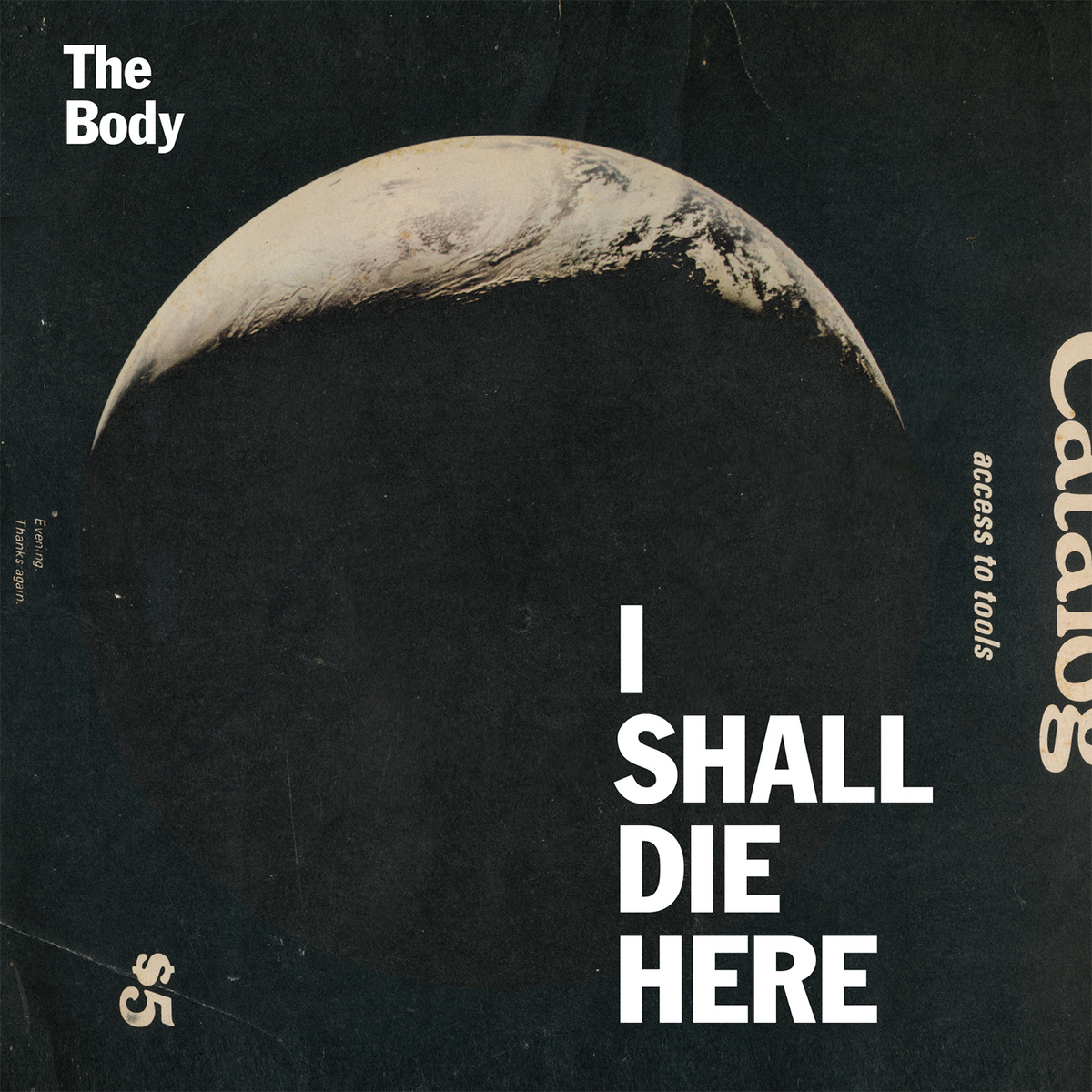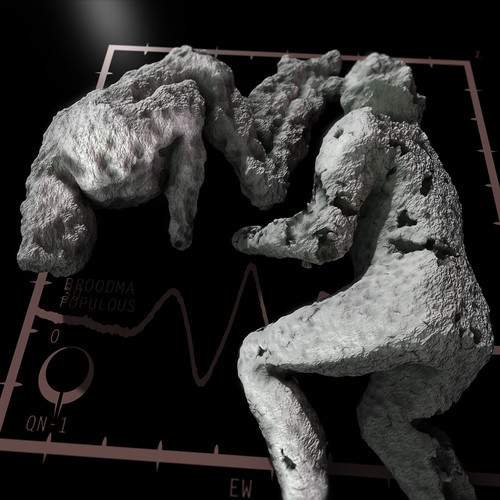For each year's first three quarters, we celebrate by sharing a list of our favorite music releases. Unlike our year-end lists, these quarter features are casually compiled, with an aim to spotlight the underdogs and the lesser-heard among the more popular picks. More from this series
Back in March, we published our inaugural quarter list, featuring our favorite 20 releases from the first three months of the year by artists like E+E, Lil Herb, Actress, and Thug Entrancer. Now we’re back with our second-quarter favorites — spanning roughly from April through June — which includes a couple that we missed the first time around and an even looser definition of what qualifies as a release (two of the picks below exist only as single-track SoundCloud streams). Expect some kawaii pop and caustic noise, Brazilian carnival rhythms and atomized beats, fractured rap and #problematic metal, even recordings literally dug up from the dirt.
But before we get to the list proper, here’s a ridiculously long shortlist + some editor picks: Life Sim’s This Life, Madalyn Merkey’s Valley Girl, Fear of Men’s Loom, Wreck and Reference’s Want, DJ Marfox’s Lucky Punch, Karmelloz’s Source Localization, TCF’s 486669f0e9b…, Gucci Mane & Young Thug’s Young Thugga Mane La Flare, Fatima Al Qadiri’s Asiatisch, Future’s Honest, Lotic’s Damsel in Distress, Ancient Astronaut’s Ancient Astronaut, Sculpture’s Membrane Pop, Swans’s To Be Kind, Pure X’s Angel, Ben Frost’s A U R O R A, Ian William Craig’s Theia and the Archive, DJ Moondawg’s We Invented the Bop 2, Ivy Barkakati’s Star Report, Sd Laika’s That’s Harakiri, M. Geddes Gengras’s Ishi, Traxman’s Da Mind Of Traxman, Vol. 2, Container’s Adhesive, Diamond Black Hearted Boy’s How The West Was Won, Powell’s Club Music, Islaja’s S U U, 2 Chainz’ Freebase, and Jónó Mí ló’s Eco Reject Mixtape.
Fennesz
Bécs
[Editions Mego]

As stubborn analog heads deride the sterility of software synthesizers and laptop lobbyists tout their machines’ “infinite possibilities,” Christian Fennesz ambles into the middle of the debate, cracks a smile, and shows us that we can have it any way we like. The Austrian multi-instrumentalist approaches his multi-layered compositions in part from the perspective of a fastidious soft-synth aesthete, keen to explore jarring textural juxtapositions, otherworldly new plug-ins, and Max/MSP’s still unplumbed depths of disfiguration. In our recent interview, Fennesz quite simply states, “I like noise music a lot,” as if we couldn’t tell from the static-charred tumult of “The Liar” or the intensifying digital clipping of “Bécs.” But noise, in Fennesz’s hands, doesn’t alienate as much as fascinate, beckoning us to lean in and observe the craftsmanship of its fine grains. Although Bécs would bewitch us with those qualities alone, it’s another aspect of Fennesz’s practice that supplies the towering emotional peaks of tracks like “Static Kings” or the epic “Liminality”: his crystalline guitar work, presented as spontaneous takes flecked with winning imperfections, animating his songs with legible melodies and harmonic progressions etched in thick lines over the ambient haze.
Ninos Du Brasil
Novos Mistérios
[Hospital Productions]

Novos Mistérios is like arriving in a country that never existed until the soil has been touched. Everything there is naturally unnatural, and their culture, technology, architecture, fashion, etc. is all familiarly “WTF?” Dancing is their only form of communication. Your navigator thinks that tapping is some kid banging with shovels and shit and shells, but none of the assessment is really that sound. Drums are not hollow or stretched-hide. Lights flicker like something is becoming. The version of you that is NOT you is welcome at Novos Mistérios under faith, not experiment. And the definitions of celebration, paranoia, hardcore sex, and normative seem to fade together in waves of material woven so tight it surpasses Kevlar. The politics of it is beyond individual mental capacity. Sometimes your nose bleeds. Hospital Productions has been reaching deep within the hearts of beat this year (Exoteric Continent, Ivy Barkakati, Dual Action). But add Ninos Du Brasil to that list, and world-building reaches max-level mind expansion. On par with High Wolf, L. Pierre, and [your favorite post-game drum-circle], Novos Mistérios gratifies all the senses of what makes postmodern agita tolerable, even at your most lax’d settings. The chain is OFF on this one. It will get you on an equalizer grind too! Will you survive the journey into and escape out of Novos Mistérios?
Freddie Gibbs & Madlib
Piñata
[Madlib Invazion]

When TMT reviewer Gabriel Samach wrote, “After 10 years, I think we may finally have the next Madvillainy,” my initial reaction, having not yet heard Piñata, was an entirely skeptical “Yeah, sure, okay.” However, by the time I reached the interlude at the end of “High,” as my reaction mimicked the seizing dip-smoker’s howl, I began to think Mr. Samach might be onto something. Previous exposure to Gibbs had convinced me that his skill set made for better live performances than records. But now I realize that Gibbs simply needed a masterful beat conductor like Madlib to provide the perfectly imperfect (read: “ain’t fully quantized”) accompaniment for his raw yet polished always-in-the-pocket intensity. And really, there is no one “like Madlib” living today. Unfortunately, some cats are too caught up worshiping the ghost of Dilla to recognize that his only peer is currently pushing the craft even deeper into future realms of funk. As for the question of this being “the next Madvillainy,” it might be; but more importantly, it’s the first Piñata, and that’s something equally deserving of our highest admiration.
GFOTY
Secret Mix
[PC Music]

The scattered tracks and mixes pumping out of the enigmatic London-based pop factory/production company PC Music typically don’t bode well for inclusion on sanctifying, historicizing features like these. But GFOTY’s Secret Mix is so fun (!), so cartoonish (!!), so spastic (!!!) that we’re reminded of how exhilarating it can be to NOT GIVE A FUCK, despite even the mix’s nine-minute runtime and six-song tracklist (only three of which are original). Of course, this “exception” also speaks to the elastic, time-compressed velocity of GFOTY’s music, whose plasticized veneer and simulated naiveté make its aesthetic feel independent of any human operator and therefore also of any clearly-defined format. GFOTY even removes herself somewhat from PC Music’s more visible ✩avastars✩ (Hannah Diamond, Princess Bambi) by adopting ARK Music Factory-on-Red Bull production tricks and staggeringly complex algorhythms™ that lead to pop manifestations of the more overtly hyperreal and hypertextual variety. But there’s zero hostility here: these tracks party in a refreshingly inclusive (web) .domain, one in which GFOTY and PC Music CEO/creative outlaw A. G. Cook make rhythms with finger-snaps and melodies with helium; in which pop tropes are rendered anew through a balance of nuanced treatment and brazen intensification; in which gratification isn’t deferred or denied, but is instantaneous, inscrutable, incessant — and oh so devine. ♩ ☺ ✉ ✆ ♥
copeland
Because I’m Worth It
[Self-Released]

Because I’m Worth It, copeland’s first “official” full-length since her departure from Hype Williams, doesn’t waste time with ham-fisted gestures. Instead, the album harnesses psychic references in a manner that made her former duo so enduring to some and so impenetrable to others. The clues start with the bewildering album cover, which features a strikingly abrasive, ice-cold stare from copeland, an image whose cultural implications find continuity in the music: “l’oreal” acts as both an affirmation of worth and a foil to the beauty corporation and its slogan (“Because you’re worth it”); “Fit 1” turns the objectifying Brit slang on its head; while “advice to young girls” suggests that an authoritative voice commanding empowerment is, by copeland’s own admission, a joke, even as it could be taken by listeners as a call-to-arms. With her tactics ranging from wincing sine-wave-damaged depth charges (“Faith OG X”) to the purposefully cliché (“DILIGENCE”), there’s no assurance that the listener is making a “correct interpretation” of its content (and my own here is clearly just one of many possible). But that she manages to evoke such contemplation on an album that’s only 30 minutes long, where half the songs don’t even contain vocals, is itself an incredible achievement.
Amnesia Scanner
AS LIVE [][][][][]
[Self-Released]

Perhaps the most dizzying and hair-raising 23 minutes of an especially dizzying and moderately hair-raising spring, AS LIVE [][][][][] threatens to liquefy the ground underneath listeners’ feet through its sonic alchemy. A sometime-Mykki Blanco producer and otherwise unknown entity, Amnesia Scanner creates an urgent and fearsomely dense ambience broiling with sinister tension. Sanger-sequenced drums and atomized vocal samples shoot through the cyberplasm with enzymatic fury, agglutinating and hydrolyzing motifs at a ruthless pace. Thumping, ticking, screeching compounds of rhythm, code, and variation burst out of each other, shrapnel and ooze at the same time, each assault leaving no trace of the last one except shattered glass and shredded membranes. Spin, slice, read, reassemble. Just the right mistake. A sudden change of substance. A barrage of events too fleeting to be processed as experiences, a sensory smash-and-grab-and-don’t-let-go, a subclinical episode induced from without. “Live” in the same sense that a virus is alive: an iron grip, a tightly wound bundle of data, an invasion into an unsuspecting host. Repeat, repeat, repeat.
Nicholas Szczepanik
Not Knowing
[Desire Path Recordings]

Many albums released in the past few months have been maximalist, violent affairs. Producers have been hammering dents and scuffs into their beats and tearing the stuffing out of their mixes in a bid to explore the limits of loudness and harshness. It seems both musician and listener want their toast fully scorched on both sides. Outside this maximalist war zone is Nicholas Szczepanik, an artist of compositional restraint and nuance, who released Not Knowing, a therapeutic journey that is peaceful and forlorn, evolving at a glacial pace. I’ve been hooked on Szczepanik’s music since 2011’s Please Stop Loving Me, where the artist expanded chords to galactic length in a similarly patient fashion. Taking direction from veteran minimalists such as Thomas Köner, Éliane Radigue (to whom Not Knowing is dedicated), and William Basinski, Szczepanik’s loops evolve into exhaustion before collapsing into themselves like a miniature model of the universe. In soporific rapture, the music paints intense fear and wonder of both formative discoveries and the mysterious processes of memory, running from and toward the same things in a green field under a pearly sky. Re-forgetting and un-living.
The Soft Pink Truth
Why Do The Heathen Rage?
[Thrill Jockey]

OF VIRTUOUS PARAGONS, LEGENDARY COTERIES OF MYTHIC VOLATILITY IMPEL SATIRICAL PROVOCATIONS. MOBILIZING LURID NEONATES BOUND UNTO SONOROUS POUNDING, A FERVID JESTER’S AUTHORITY INTENSIFIED THE PULLULATION OF MALEFIC GLORY. RECITATIONS ECHO IN THESE TESTIMONIAL CAVES OF EXHORTATION. WHEREFORE METAMORPHIC VITALITIES INSTIGATE GALVANIC CAVORTIONS. ZEALOUS CONTAMINATION MODIFIES ANTEDILUVIAN INCANTATIONS OF TENEBROUS AUTOCHTHONY. ANCIENT ORTHODOXY DISINTEGRATES. INSIDIOUS DAWN OF PARADOXICAL ASTONISHMENT SUPPLEMENTS THE DISSOLUTION OF GENERIC SUFFOCATION (A UNIVERSAL AUTOPHAGIA). THESE CLANDESTINE TRUTHS BEHOVE EXPLICIT MANIFESTATION. UNCEASING DISRUPTION OF GRIEVOUS TRADITION HATH WROUGHT NOBODY’S MALEDICTION. INFINITESIMAL CASSETTES OF CONCOCTION INSCRIBE UNCONDITIONAL LAUDATION. (Ameliorate confusion instrumentalizing Invisible Oranges’ guide to Death Metal English.)
Magic Fades + Soul Ipsum
Zirconia Reign
[1080p]

Zirconia Reign is all about aesthetics — postmodern, “post-ironic” digital-era sounds, devices, and forms that could run the risk of simply sitting static, fading into the web’s ether like their mimicked and deconstructed counterparts. Fortunately, through the bizarro lens of Magic Fades and Soul Ipsum’s collective jamming prowess (with a serious flair for sonic exploration), these live experimentations with techno and R&B don’t fall flat — far from it. There are sounds and musical gestures on here that could be read as a nod to the past or an imagined future, to some bizarre, codified commentary, all taxing topics I dare say. Or you just could enjoy its sensory delights, which are delivered in much the same manner as how its creators spawned it: with “kush, coffee and tonnes of LaCroix pink grapefruit Soda Water.” Délightful.
The Body
I Shall Die Here
[RVNG Intl.]

Cultural moments are best defined by how they confront death. Ours seems bent on avoidance altogether. We’re all guilty. We hide from death by nurturing our identities, by curating a near-pointless museum of the self. We cynically, shamelessly, and compulsively consume: images, hopes, shit. We spend our lives filling tombs with mementos that remind us about who we want to be and what we want to be about, hoping all the while that others, equally consumed, might take notice. Perhaps more than any other time in history, to be is to be perceived. But all of that being misses the point: biology remains the singular democratizing fact. It tells us all “no.” So honor those artists who dare resist us and our stupid inclinations. Listen up. The Body have some news for you, and you’re not going to like it: you’re going to die here.
Brood Ma
P O P U L O U S
[Quantum Natives]

P O P U L O U S is the complete critique of idiom signifier succinct to the dynamic dichotomy of purist sonic warfare via flayed pop. Or whatever DeForrest said <3. But why can’t we hear Brood Ma’s brand of audio battlefield — sonically complete with clip-shitting bullets and HD reload times — in the same way we saw Prodigy as mid-90s BAD? It’s just music, right? I LOVE CHEESY SHIT!! Door opens to the next level of P O P U L O U S, and it’s colored in dream-sheen brightness that makes visions harder to remember; each turn takes you toward the unknown. Become the creature you were meant to be and become. Is this an assassination attempt on pop music as a cultural theory or an outright attack on everybody who thinks I’m playing Brood Ma obnoxiously loud on the beach? Also, don’t forget Brood Ma’s r e P O P U L O U S. It’s quite the post-skyline of Earth’s new world: long metallic pieces jaggedly stretching out and choking at the sunlight. We inevitably kill our babies.
Kemialliset Ystävät
Alas Rattoisaa Virtaa
[Dekorder]

Singular and perplexing, Alas Rattoissaa Virtaa is as difficult to classify as it is enjoyably disorientating to listen to. Weird, lilting melodies drift in and out of the surrounding chaos of layered synths and samples to vegetate into new worlds, rendering woodland visions and quests in bright pixels. Of course, it’s slightly absurd to think of it as some kind of “folk,” but if there’s any remnant of folk left, it’s mainly to be found in these mysterious melodies rather than the arrangements or instrumentation, which invert any folky fixation on the natural for a playful kind of artifice rooted in cut-ups and joyful sonic clutter. This cheerful, almost innocent outlook is allied to and oddly emphasized by an undercurrent of precision and care — Alas Rattoissaa Virtaa is perfectly crafted without pretention or excess, and Kemialliset Ystävät’s assurance in the intimacy of the microcosmic domains they occupy here makes for a curious and beguiling prospect.
Valerio Tricoli
Miseri Lares
[PAN]

After an incredible 2013, it was unclear what new territories were left to be staked out by Bill Kouligas’ exploratory PAN label. With the announcement in January of EPs from artists as diverse as Helm, Bass Clef, Beneath, M.E.S.H., and Black Sites, it became obvious that PAN was keeping its sonic options open. Then there’s Miseri Lares, an album as unmatched in PAN’s catalog as it is in the world of experimental electroacoustic music at large. Recordings rich with tone and spatiality come together in a collage of affect, as Tricoli drags the listener through his “wretched house,” colored with impressions of interiority and captivity. There’s a sense of giving up or handing oneself over to the sound while listening to Miseri Lares, and in this, the bleakness and horror let up for a moment to reveal the sublime dexterity of Tricoli’s method. The beauty here, as Birkut originally noted, is in the ability of the music to call you back into its sinister musk.
Death Grips
niggas on the moon
[Third Worlds]

niggas on the moon is supposed to document three men (and one woman), but if we’re to believe an MC who scrapes his tongue on the rhyme “Used to know who I was/ Fuck if I know who that was” before the first intermission, we can be pretty sure that its crowded mania is less a revelation of personal truth than a denial of that Truth’s possibility. Within its maze, Hill’s drums skitter into a thousand irrational shards, Morin’s fractured samples duplicate themselves incessantly, and Ride’s indelicate soothsaying trips over itself, creating a hall of mirrors where everything and nothing is true all at once. As the three judder through inhuman glitch-hop and depersonalized electro-noise, Burnett gobs out lines like “I’m a bullshitter,” “Just don’t touch me,” and “I take my life any way you can slice it,” tussling with the hot air misspent on the band and warring against a world in which we can be only by being dissected, homogenized, and compartmentalized. And on niggas on the moon, their name became almost prophetic, since the only thing with any hold on their reality was the process of disintegration that reduced them to a train of breathless, fragmented convulsions.
Jason Lescalleet
Much To My Demise
[Kye]

For Much To My Demise, Jason Lescalleet buried tape recordings in the dirt of his backyard. Several months later, he dug them up as source material. In the clipped piano, incomprehensible speech, swollen drones, and rickety loops of these three pieces, we hear the literal sound of the earth’s encroachment on humanity’s handiwork. In the album’s liner notes, Lescalleet asks us to “celebrate its senescence,” which is harder than it sounds. It all seems almost redundant and simplistic laid out like this — of course objects in the physical world crumble. Even so, I felt a little internal resistance to Lescalleet’s request in the liner notes: “discard the paper sleeve that is included in this album.” But Much To My Demise has a way of getting under the skin either way, rendering physically and emotionally what was, at first, just dry, dead fact, because — surprise! — decay does not taper into nothingness. Instead, as Matthew Phillips said in his review, it contorts into “the ghostly sound of inevitability.” And so, after all, I trashed the sleeve.
Perc
The Power And The Glory
[Perc Trax]

The Power And The Glory drips with decay; there is simply no escaping it. It’s a beautifully botched scrambling of static, vocal discord, and morbid techno that’s frequently deemed to carry political sentiment. A harrowing, noise-tinted track titled “David & George” bears all sorts of connotations concerning the London-based producer’s stance, but ultimately, it’s about the quality of these tunes as opposed to their inspiration. On his second album as Perc, Ali Wells beckons his audience through a maniacally repetitive ritual of friction and conflict. But instead of kicking against it or struggling through, the most gratifying rewards come upon dwelling in this wretched masterpiece — let it seep into your world instead of the other way around, for thine is the kingdom, the power, and the glory, now and forever.
Gobby
Wakng Thrst For Seeping Banhee
[UNO NYC]

What makes Gobby’s Wakng Thrst For Seeping Banhee so enjoyable is its total lack of respect for the apparent rules of music making. Hopping around genres, emotions, and settings with no real regard for continuity, it’s the sound of an artist in complete control of not giving a fuck, of knowing what he wants to do and not worrying about whether or not you like it. Moreover, it’s a confident statement about spilling some milk and seeing what shape that milk takes; not shedding a single tear over it, but reveling in it. Samples and rhythms are the foundation of this funhouse, and the walls are built out of aluminum voices and cardboard percussion. Half of the carpet is covered in petroleum-lubed synths, the other half in chewed-gum bass. The doors are irregular and hang loosely on worn hinges, and the lights only flicker when turned on. It’s a difficult house-tour to take, but if you can make it past its disorienting nature, I think you’ll find Wakng Thrst For Seeping Banhee to be equal parts beautiful, hilarious, and horrifying.
Millie & Andrea
Drop The Vowels
[Modern Love]

The car that, party that never starts, got there, destinations long ago, screwball’s chance on a narrow straight chase, down on luck rebounds, resounds respect cirumstantial croizened bunches battered to a halt, heaving solemn, sold on semisolid sick on circumstantial, voidal metal filings biting down on the frozen stolen moment, skips significance, gets borderline, sopping surfacing skipping rope, stones, even numbers and flashing forward to standing still, watching water, sprouting hair and hatching nonstarters, killing the lights and humming the tune, motors that only waft and sputter amidst all the heavy lifting. It’s not impossible to make the case that Millie & Andrea’s Drop The Vowels is more of a curious one-off than an AOTY contender, but there’s an amazing thing that happens while listening. One starts to hear a real meeting of the minds (somewhat akin to the “whatever sticks” fun of 2012’s OPN/Tim Hecker project) that just makes a rare kind of sense. Stott’s unrelenting throb is recognizable, as are the skincrawlingly vivid insectoid textures of Demdike Stare. But what emerges is the startling potency that comes only from a classic album (you heard me, VH1!). This one comes over you like an elaborate sweaty fever dream that’s too fascinating not to cling to when it’s all over.
Fire! Orchestra
Enter
[Rune Grammofon]

It’s easy to portray Mats Gustafsson’s latest project as a throwback to 60s acid-fried, psych-jamming bands. All the elements are here: a large ensemble playing freeform music, vocalists chanting pseudo-mystical lines (one of them sounds a lot like Grace Slick), and a second half that riffs on The Beatles’ “Tomorrow Never Knows,” harkening back to when Zappa’s Mothers opened their Free For All LP with a deranged version of “Louie Louie.” Yet the comparison fits as far as the band’s sound has evolved in such a direction. Departing from last year’s Exit!, where the Orchestra retained the fiercely avant-jazz foundation of the Fire! Trio despite a tenfold size increase, here we find them developing their compositions on their integral strengths organically. Taking a turn away from Second Exit, where the Orchestra dismissed half its personnel and adopted Agharta-era Miles-Davis echoes, the massive lineup returns here with some surprisingly funky textures: their opening sequence recalls the tutsi-grooved rock of Ginger Baker’s Air Force, while later they mate The Brotherhood of Breath and The Globe Unity Orchestra with magnificent power. With both Second Exit and Enter, the Orchestra has crafted a diptych of mind-melting, soulful tunes, beyond the reach of anyone in the (recent) wave of artists looking for transcendent experiences through mysticism, technology, or otherwise.
Wold
Postsocial
[Profound Lore]

Wold’s final(…) statement systematizes a manifold of violence around the form of the inverted pentagram, perhaps the strongest power symbol in the black magic arsenal. Postsocial is an impenetrable but hypnotic ritual set in a remote, occult lodge, in which Fortress Crookedjaw and Obey repeatedly violate every conceivable formula in order to forge their own tools for their assault on the world. The disregard that black metal has historically shown for production quality here contorts into an active destruction of clarity, a violence Wold applies against their own work and the audience’s ears. That twofold violence recurs lyrically, as Crookedjaw assails his vocal cords, spewing at listeners bile-laden lyrics about murder, anti-masonic rites, and ritual sex with an invoked demonic hag. Beneath and throughout, a teeming sonic cesspool conceals defiled signifiers ranging from perversions of early Bathory to sludge-covered Burzum tremolo-picked guitar drones to explosions of Masonn-ic destruction. It’s hard to imagine that a more difficult listen will arise this year, but should anyone attempt it, it’s even more doubtful that 2014 will see Postsocial’s austere violence repeated. Wold’s profane metallurgy has culminated here in this, their greatest weapon. Fuck society.
For each year's first three quarters, we celebrate by sharing a list of our favorite music releases. Unlike our year-end lists, these quarter features are casually compiled, with an aim to spotlight the underdogs and the lesser-heard among the more popular picks. More from this series
